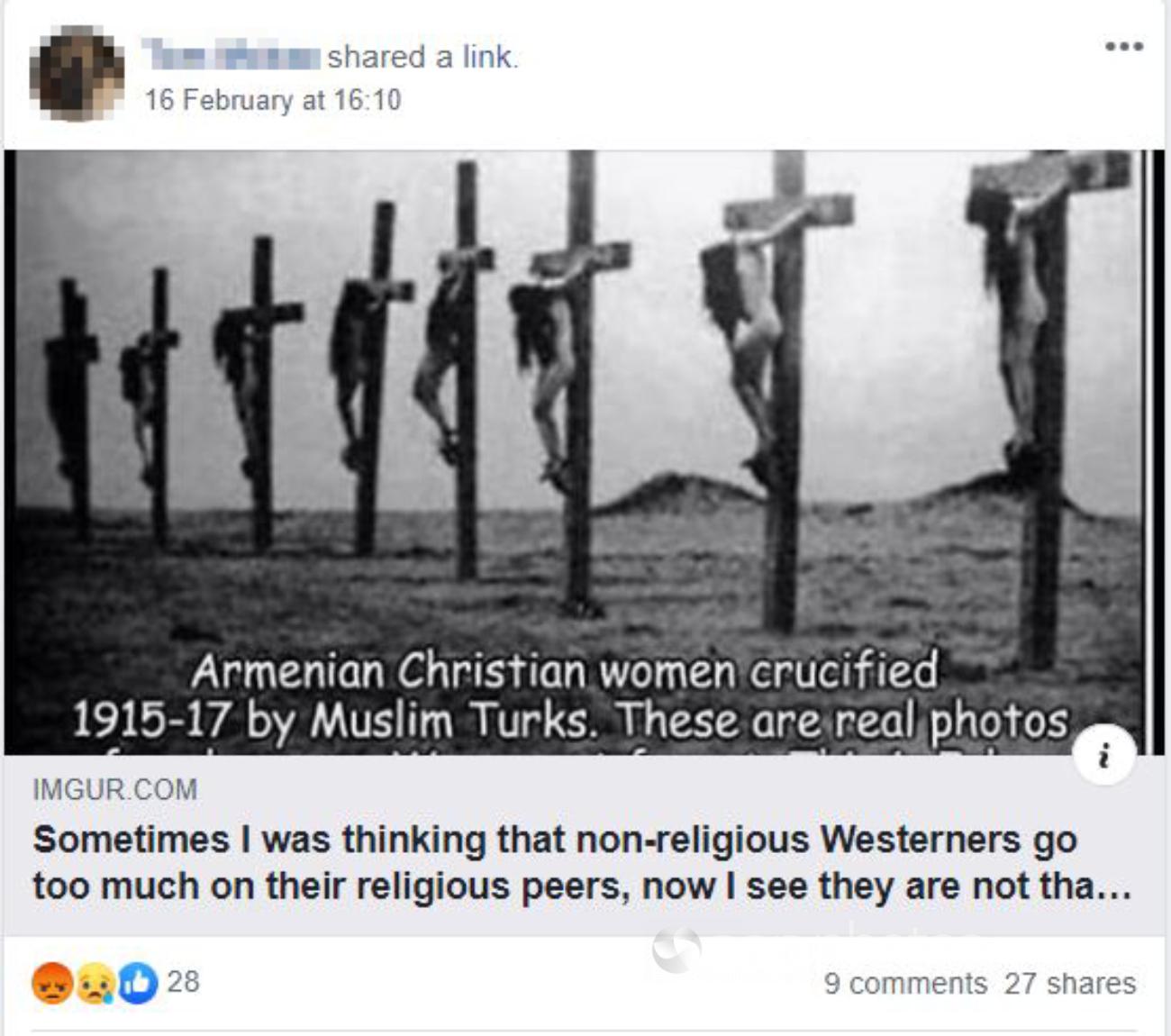The Statement
An image purporting to be a “real” historical photo of a World War I-era atrocity is being shared on Australian and overseas Facebook pages.
The black and white photo, which shows eight women on crosses, has the following text written over it: “Armenian Christian women crucified 1915 – 1917 by Muslim Turks. These are real photos of real women. We cannot forget. This is Islam”.
The post, on a page called “Left & Right of Politics (The Experiment)” has been shared and liked more than 25 times.
The image, which has also been posted on sharing site Imgur has been shared by other Australian groups here and here. Overseas Facebook groups have also shared here, here and here. In total the photo has received more than 11,500 likes across multiple posts, been shared more than 4,900 times and has had more than 19,400 interactions.

The Analysis
The black and white image in the post purports to be a photograph of an atrocity committed amid the dislocation of the Armenian people in the Ottoman Empire during the years of World War I.
The deaths and deportations between 1915 and 1916 and their description as genocide remain a hotly contested topic.
Armenian groups worldwide and many nations say more than a million Armenians were killed by Ottoman Empire forces in what was an act of genocide.
The Turkish government rejects claims about the number of people killed or that the deaths that occurred constitute genocide.
The Australian government has not formally recognised the events as genocide, with a Department of Foreign Affairs official saying in 2018: “we are deeply sympathetic to the Armenian people and recognise that those events took place, but we don’t recognise those events to be genocide as defined under the 1948 convention”.

The story of the photograph in the Facebook post begins with a 1918 book.
An Armenian survivor of the period, Aurora Mardiganian, detailed the deaths of her family and other experiences in a book called Ravished Armenia.
That book was the basis of a 1919 film, originally titled Ravished Armenia and later renamed Auction of Souls, according to writer Andrew Erish in his book on early US filmmaker Colonel William N. Selig, “The Man Who Invented Hollywood”.
Former resident film historian at the Academy of Motion Picture Arts and Sciences Anthony Slide said during a 2015 lecture at the University of California’s Hammer Museum that the silent film was successful, but the eight reels of original film and its copies were lost. (see 26:45 mark)
In the late 1990s a 25-minute montage of footage from the film was discovered, Mr Slide said.
AAP FactCheck asked Dr Carla Garapedian of the Armenian Film Foundation about the provenance of the image used in the Facebook post.
Dr Garapedian said the image was not a photograph of the actual events that occurred around 1915 but rather an image from the production of the Auction of Souls/Armenia Ravished movie.
“Those are actresses on a film set in California, not Ottoman Turkey,” she said in an emailed response.
Dr Garapedian said eyewitness accounts described women being impaled in “horrible” deaths but crucifixion as depicted in the film was not used.
Mr Slide said the crucifixion image is “the most famous image from the film… filmed actually, we believe, on the beach at Santa Barbara”. (see 20:43 mark)
The Verdict
Based on the evidence, AAP Factcheck found the Facebook post to be false. Contrary to the claim that “these are real photos of real women” the image is from a 1919 movie made in the United States.
False – The primary claims of the content are factually inaccurate.
AAP FactCheck is an accredited member of the International Fact-Checking Network. To keep up with our latest fact checks, follow us on Facebook and Twitter.
All information, text and images included on the AAP Websites is for personal use only and may not be re-written, copied, re-sold or re-distributed, framed, linked, shared onto social media or otherwise used whether for compensation of any kind or not, unless you have the prior written permission of AAP. For more information, please refer to our standard terms and conditions.

















